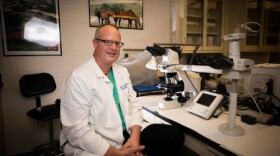-
Sahar Alameh, Ph.D., is on a mission. She wants to prevent today’s middle and high school students from facing a common regret in adulthood — wishing they had paid more attention in school. She is using research around the current pandemic as a teaching tool. She talks about her methods on this week's edition of Dr. Greg Davis on medicine.
-
Elizabeth Rhodus’s past experiences as an occupational therapist, and a motivation to enhance clinical care, led her to develop the innovative intervention now known as Harmony at H.O.M.E., which emphasizes sensory-based techniques in the home environment for those living with dementia. She talks about the technique in this week’s edition of Dr. Greg Davis on Medicine.
-
The Retaining Employment and Talent After Injury/Illness Network (RETAIN) Kentucky Program implemented by the University of Kentucky works with employees, employers and health care providers to address issues that can keep people from returning to work after injury or illness. RETAIN also helps people who may be at risk of leaving their employment to stay on the job. Dr. Greg's guest this week is RETAIN outreach coordinator Melissa Claar.
-
Although most cases of Lyme disease can be cured with a two-to-four-week course of antibiotics, some patients still experience lingering, debilitating effects of the disease months after they finish treatment. Dr. Greg talks with Ilhem Messaoudi, Ph.D., and Brian Stevenson, Ph.D., in the Department of Microbiology, Immunology and Molecular Genetics, about a new study seeking to understand if the antibiotic regimen used to treat Lyme disease could also be contributing to Post-Treatment Lyme Disease Syndrome (PTLDS), which includes ongoing symptoms of pain, fatigue or difficulty thinking.
-
A study from the College of Social Work at the University of Kentucky showed Black survivors of intimate partner violence (IPV) receive significantly less workplace support than their White counterparts. Dr. Greg talks with study co-author Kathryn Showalter, PhD, of the University of Kentucky College of Social Work.
-
The recent announced retirement of actor Bruce Willis due to complications with aphasia has brought the condition national attention. Aphasia is an acquired language disorder usually resulting from a stroke or trauma in the brain’s dominant hemisphere. The condition causes a disconnect in the areas of the brain responsible for language and can impact a person’s ability to speak, read, write, and listen (ranging from very mild to severe.)There is no cure for aphasia and most patients struggle with lifelong side effects. This week on Dr. Greg Davis on Medicine we talk all things aphasia with Tim Ainger, clinical neuropsychologist and an assistant professor of neurology with the UK College of Medicine and the Kentucky Neuroscience Institute.
-
What if the foods that elicit strong memory and emotion in us no longer tasted the same? Certain foods hold so much sentiment in our lives, howwould we react if we could no longer have that experience? Dr. Greg talks with UK Chef in Residence Bob Perry who will be a featured speaker at this year's International Society of Neurogastronomy Symposium next month in Bonita Springs, Florida.
-
March is National Kidney Month and this week Dr. Greg talks with LaShana Harris with the Frankfort/Lexington Chapter of Kentucky Black K.A.R.E. KARE stands for Kidney Awareness Resources Education Initiative, which is focused on preventing chronic kidney disease, particularly in African American communities.
-
Researchers at the University of Kentucky are looking for participants in a study focused on gaining insights and perspectives from gender and sexual minority individuals and their families. The goal is to learn how the healthcare field can better serve these individuals, their families, and communities. This week Dr. Greg talks about theBarriers to Healthcare study with principal investigator Kelly Hill, UK Psychiatrist and Medical Director of the Adolescent Behavioral HealthUnit.
-
You've probably never heard of L.A.T.E. It's an acronym that stands for Limbic-predominant, Age-related TDP-43 Encephalopathy. It's a form of dementia which the symptoms often mimic Alzheimer's disease. Dr. Greg talks with colleague Dr. Pete Nelson, a researcher with the UK Sanders Brown Center on Aging about a new clinical trial for L.A.T.E. patients.

Play Live Radio
Next Up:
0:00
0:00
Available On Air Stations










